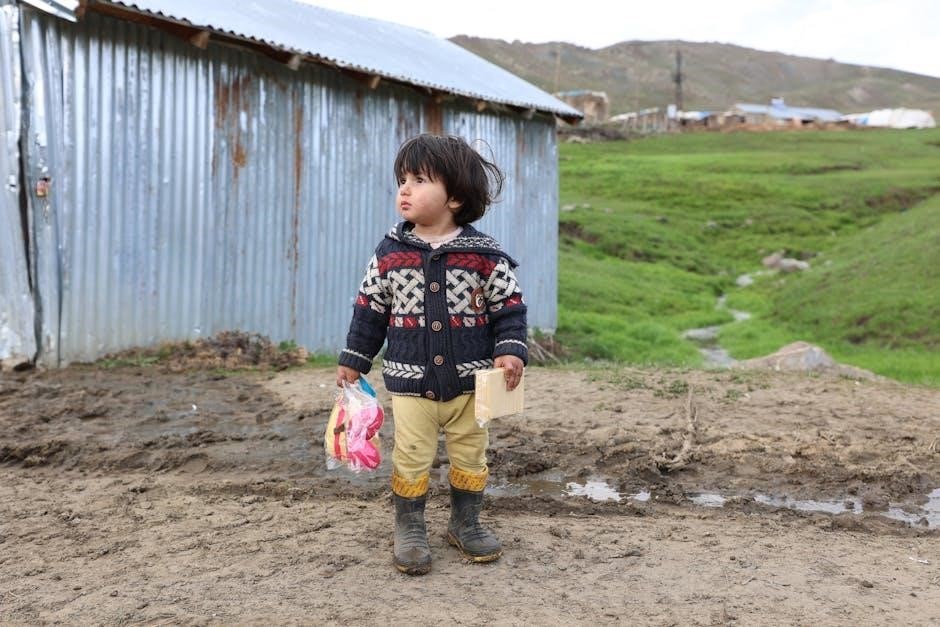This section introduces the cultural approach to human development, emphasizing how cultural factors shape developmental stages and processes across diverse global contexts.
1.1 Overview of the 3rd Edition
The 3rd edition of Human Development: A Cultural Approach offers a comprehensive exploration of development through a cultural lens. Published by Pearson, it integrates updated research, cross-cultural examples, and interactive tools to engage students. This edition emphasizes global diversity, preparing learners for a culturally complex world. New features include fresh topics like diets in childhood, executive function, and sleep patterns, while maintaining a chronological structure. It is available in print and digital formats, including Revel, an interactive platform for enhanced learning.
1.2 Importance of Culture in Human Development
Culture plays a pivotal role in shaping human development, influencing values, practices, and developmental milestones. It determines how individuals perceive their world, interact socially, and navigate emotional landscapes. Understanding cultural diversity is crucial for addressing global challenges, as it fosters empathy and inclusive practices. This edition emphasizes culture’s impact on social, emotional, and cognitive growth, highlighting its significance in a globalized world. Recognizing cultural differences enables tailored approaches to education, policy, and mental health, promoting equitable development across diverse populations.
1.3 Authors and Their Contributions
Jeffrey Jensen Arnett and Lene Arnett Jensen, renowned experts in developmental psychology, co-authored the 3rd edition of Human Development: A Cultural Approach. Their work emphasizes the cultural basis of development, integrating cross-cultural examples to illustrate diversity. Arnett’s award-winning contributions, including the 2021 Textbook Excellence Award, highlight his impact on the field. Their collaborative approach blends cultural and historical contexts, providing a comprehensive understanding of human development across the lifespan and diverse global settings.
Key Features of the 3rd Edition
Updated research, cross-cultural examples, and interactive tools. Available via Revel, offering a dynamic learning experience with multimedia resources for a globalized world.
2.1 Updated Research and Data
The 3rd edition incorporates the latest research on diverse topics such as diets in childhood, executive function in middle childhood, and sleep patterns in emerging adulthood. These updates ensure a comprehensive understanding of developmental processes. The text also highlights cultural variations in cognitive and moral development, offering insights into how global perspectives shape human growth. New data reflects the dynamic nature of cultural influences, preparing students to navigate a rapidly changing, interconnected world with sensitivity and awareness.
2.2 Cross-Cultural Examples and Case Studies
The 3rd edition enriches the narrative with diverse cross-cultural examples from both the United States and worldwide. These case studies illustrate how cultural practices, such as child-rearing techniques and moral development frameworks, vary across regions. By exploring these examples, students gain a deeper understanding of how cultural contexts influence developmental outcomes. The inclusion of real-world scenarios fosters a global perspective, helping learners appreciate the complexity of human development in different sociocultural settings.
2.3 Interactive Learning Tools and Resources
The 3rd edition offers enhanced interactive learning tools, including Revel™, an engaging platform with videos, interactive figures, and maps. These resources provide hands-on opportunities to explore cultural influences on development. Journaling questions and application exercises encourage critical thinking and real-world connections. The digital format allows seamless integration of multimedia content, making complex concepts accessible and fostering a dynamic learning experience for students navigating the cultural dimensions of human development.

Theoretical Framework: Cultural Approach to Development
This framework explores how culture shapes human development, emphasizing its influence on behavior, cognition, and social interactions across diverse societies, as detailed in the 3rd edition.
3.1 Definition and Scope of Cultural Development
Cultural development refers to the process through which individuals grow and evolve within the context of their culture, shaping their identities, behaviors, and understanding of the world. This concept emphasizes how cultural norms, values, and practices influence human development across various stages. The scope includes social, emotional, and cognitive development, highlighting the role of cultural diversity in forming unique developmental pathways. This approach underscores the importance of understanding development within specific cultural contexts rather than through a universal lens, as detailed in the 3rd edition.
3.2 The Role of Cultural Diversity in Shaping Development
Cultural diversity plays a pivotal role in shaping human development by influencing values, beliefs, and practices across societies. It molds social interactions, emotional expression, and cognitive processes, creating unique developmental pathways. The book highlights how diverse cultures foster different norms for child-rearing, education, and moral reasoning. By examining cross-cultural examples, the 3rd edition illustrates how cultural diversity enriches our understanding of development, emphasizing the need for a culturally sensitive approach in a globalized world.
3.3 Comparison with Other Developmental Theories
The cultural approach to development is distinct from other theories, such as psychoanalytic or cognitive theories, as it prioritizes cultural diversity and variability. Unlike universal theories, it emphasizes how developmental processes are shaped by specific cultural contexts. By comparing these perspectives, the book highlights the unique strengths of the cultural approach in understanding human development, offering a more comprehensive and nuanced view of growth across diverse populations and settings.

Stages of Human Development Through a Cultural Lens
This section explores how cultural factors influence human development across the lifespan, from infancy to adulthood, highlighting diverse practices and beliefs that shape growth and maturation.
4.1 Infancy and Early Childhood
Infancy and early childhood are profoundly shaped by cultural practices, influencing emotional, social, and cognitive growth. Practices like co-sleeping, breastfeeding norms, and cultural rituals vary widely, reflecting societal values. For example, some cultures emphasize communal caregiving, while others focus on individualized attention. These early experiences lay the foundation for future development, highlighting the role of culture in shaping developmental trajectories. The 3rd edition explores how these practices impact milestones, underscoring the importance of cultural sensitivity in understanding early childhood development.
4.2 Middle Childhood and Adolescence
Middle childhood and adolescence are critical periods where cultural influences shape identity, social roles, and cognitive growth. Cultural practices, such as education systems and community expectations, vary widely. For instance, some cultures emphasize group-oriented values, while others focus on individual achievement. Adolescents navigate identity formation, influenced by cultural norms and societal expectations. The 3rd edition highlights how these stages are shaped by cultural diversity, offering insights into universal and culture-specific developmental patterns during this transitional phase of life.
4.3 Emerging Adulthood and Adulthood
Emerging adulthood, spanning ages 18 to 25, is a period of exploration and identity formation, heavily influenced by cultural norms. The 3rd edition highlights how societal expectations shape this transition, with varying emphasis on independence and family obligations across cultures. Adulthood is marked by roles like parenthood and career, which are culturally defined. The text explores how cultural diversity impacts life satisfaction and personal growth during these phases, offering a nuanced understanding of developmental patterns in a global context.
Cultural Influences on Developmental Processes
Culture profoundly shapes social, emotional, cognitive, and moral development across the lifespan, influencing values, behaviors, and relationships in diverse global contexts, as explored in the 3rd edition.
5.1 Social and Emotional Development Across Cultures
Social and emotional development varies significantly across cultures, with differences in parenting styles, community involvement, and societal expectations shaping emotional expression and social behaviors. For instance, collectivist cultures often emphasize interdependence and harmony, while individualist cultures focus on personal achievements and autonomy. The 3rd edition highlights how cultural norms influence emotional regulation, empathy, and identity formation, providing insights into how these processes differ globally. This understanding is crucial for fostering cultural sensitivity in developmental psychology.
5.2 Cognitive Development and Cultural Variations
Cognitive development is deeply influenced by cultural practices and values, shaping how individuals process information and solve problems. For example, some cultures emphasize analytical thinking, while others prioritize holistic or relational reasoning. The 3rd edition explores how educational practices, language, and societal expectations vary globally, impacting memory, problem-solving, and conceptual understanding. These cultural variations highlight the importance of considering diverse learning styles and intellectual frameworks in understanding cognitive growth across the lifespan.
5.3 Moral Development and Cultural Norms
Moral development is profoundly shaped by cultural norms, as societies define right and wrong differently. The 3rd edition highlights how cultural values influence moral reasoning, with examples like collectivist societies emphasizing community harmony over individual rights. It explores how moral dilemmas are framed and resolved across cultures, underscoring the role of practices such as storytelling and rituals in teaching ethical values. This section reveals how cultural diversity shapes moral understanding and behavior across the lifespan.

Applications of the Cultural Approach
This section explores how cultural insights inform practices in education, policy-making, and mental health, emphasizing culturally sensitive strategies to address developmental challenges globally.
6.1 Education and Child-Rearing Practices
The 3rd edition highlights how cultural values shape education and child-rearing practices globally. It explores cross-cultural variations in teaching methods, parental involvement, and societal expectations. The text emphasizes how cultural beliefs influence learning environments, such as collectivist vs; individualist approaches. Additionally, it discusses the role of cultural norms in shaping child-rearing practices, including discipline, emotional support, and cognitive stimulation. These insights help educators and caregivers adapt strategies to meet diverse developmental needs effectively.
6.2 Policy Implications for Global Development
This section explores how cultural insights from human development research inform global policies, ensuring they are tailored to diverse cultural contexts. The 3rd edition emphasizes the importance of cross-cultural understanding in shaping policies that address global challenges. By integrating updated research and cross-cultural examples, the text highlights how policies can be adapted to respect local values and practices, fostering equitable development worldwide. This approach prepares students to contribute to global initiatives effectively.
6.3 Mental Health and Cultural Sensitivity
This section highlights the role of cultural sensitivity in mental health practices. The 3rd edition emphasizes understanding cultural variations in defining mental health and well-being. It explores how cultural norms influence emotional development and the importance of adapting mental health interventions to fit diverse cultural contexts. By integrating cross-cultural examples, the text prepares students to approach mental health challenges with empathy and cultural awareness, ensuring effective support across different populations.

Reviews and Impact of the 3rd Edition
The 3rd edition received the Textbook Excellence Award for its comprehensive cultural insights, becoming a leading resource for understanding global human development and diversity.
7.1 Academic Reception and Awards
The 3rd edition of Human Development: A Cultural Approach has garnered significant academic acclaim, earning the prestigious 2021 Textbook Excellence Award. Scholars and students alike praise its integration of cross-cultural examples and updated research, making it a standout resource in developmental psychology. Its comprehensive approach to understanding global diversity has solidified its reputation as a leading textbook in the field.
7.2 Student Feedback and Engagement
Students have praised the 3rd edition for its engaging narrative and interactive features, such as Revel™, which enhance learning. The integration of cross-cultural examples resonates well, fostering a deeper understanding of global diversity. Many appreciate the updated research and real-world applications, making the text relatable and relevant. The structured organization and fresh topics have also been highlighted as key strengths, contributing to high student engagement and satisfaction with the material.
7.4 Comparisons with Previous Editions
The 3rd edition stands out with its enhanced focus on cross-cultural examples and updated research, offering a more comprehensive view of global diversity. New interactive tools like Revel™ and expanded chapter organization improve accessibility. Compared to earlier editions, this version provides fresh perspectives on emerging topics, such as executive function in middle childhood and sleep patterns in emerging adulthood, making it a significant upgrade for students and educators seeking a modern, culturally informed approach to human development.
The 3rd edition underscores the significance of cultural influences on human development, offering a comprehensive, globally informed perspective. Future research will further explore emerging cross-cultural trends, ensuring a dynamic understanding of developmental processes in an increasingly interconnected world.
8.1 The Evolving Role of Culture in Developmental Psychology
Culture’s role in developmental psychology continues to expand, recognizing its profound impact on human growth across diverse global contexts. The 3rd edition highlights how cultural perspectives are increasingly integrated into research, education, and policy-making. By examining cross-cultural examples, the text illustrates how globalization and technological advancements are reshaping cultural influences on development. This evolving understanding underscores the necessity of incorporating cultural sensitivity in future research and practical applications to address the complexities of human development effectively.
8.2 Potential Areas for Further Research
Future research should explore the intersection of culture and emerging topics like digital technology’s impact on development. Additionally, studies on executive function in diverse contexts and sleep patterns across cultures offer promising avenues. Investigating how globalization influences cultural identity and developmental milestones is crucial. Longitudinal studies comparing developmental outcomes across regions could provide deeper insights. These areas will enhance our understanding of how cultural factors shape human development in an increasingly interconnected world.
